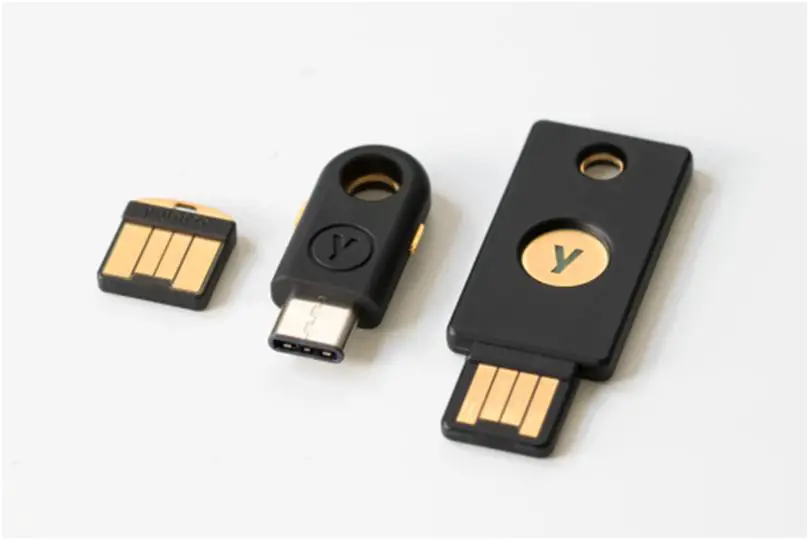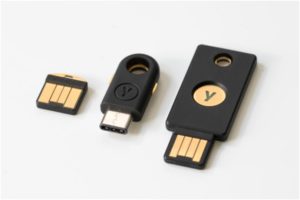We all have online accounts, and we use passwords to access them. This raises an important question – how safe is your account? In this article, we look at Everykey vs. Yubikey, and see why they present viable alternatives to passwords.
If you are reading this article, you might have been the unfortunate victim of a cybercrime such as phishing or hacking, or you might want to prevent it from happening. The internet is good, but it has also led to problems with security, since there are so many malicious people in the cyberspace that are looking for opportunities to access your information.
What are the differences between Everykey and Yubikey? How do they compare?
| Model | Everykey | Yubikey |
| Dimensions (inches) | 1.13 x 0.38 x 0.5 | 0.71 x 0.12 x 1.77 |
| Compatibility | RSA and AES encrypted sites | Any FIDO-compliant site |
| Click here | Click here |
Everykey vs. Yubikey – what are the differences?
How they work
The Everykey password manager operates through Bluetooth to enhance your online and device security, as well as acting as a replacement of your passwords and keys in general. Through the use of Military-grade security, you can unlock and lock your access controlled devices and online accounts. In a sense, it is like a key finder and 2FA key combined in one.
The Yubikey operates in a different way, as it primarily relies on U2F technology, where you use the key to authenticate you alone, and increase your security since no one else can enter your account. The key also includes USB for the desktop experience and NFC for the mobile users, making it easy for you to use it regardless of the device you prefer.
Locking and unlocking
In the Everykey, you can lock your connected devices remotely through the Bluetooth system. When it senses you have walked or moved away from the device, it locks the device automatically and unlocks it when you come near. However, the Yubikey only allows you to access your account, rather than the typical password system that risks hacking (unless you use a two-factor authentication system as a backup).
In addition, the Everykey promotes the security of your account through the generation of random passwords by the key, and all of these are secure. You can then use them to log you into sites automatically, and this is why it acts similar to a 2FA system. While 2FA proves be to a more useful security method than a password, it does have its own inherent issues, which hackers have exploited to the maximum.
Compliant sites
The Yubikey is very good at working with numerous protocols and platforms, such as through their tap-and-go authentication with Windows 10 devices and Android applications. The main information that regards the use and any other questions you may have is on the main Yubico website, and you will get everything you need from there as well as the applications it works well with.
On the other hand, the Everykey increases your security through the generation of random passwords, as long as the site adheres to RSA and AES encryption standards. You can then use them to log you into sites automatically, and this is why it acts similar to a 2FA system. In addition, you can also freeze the system when you happen to lose it, so that you eliminate the worry of someone else taking over your accounts without your permission.
Yubikey
There is not one specific Yubikey key, as there are several in the series. Overall, though, the series is proving to be very popular among many, even for those that are just starting in the online security space. The keys include Yubikey 5 NFC, 5C, 5 Nano and Security key NFC.
You only need to register, a very easy process, then tap the key to authenticate your account.
Pros
- Great process of setting up, which is really easy
- Supports many protocols
- Works very well when using NFC to connect to mobile devices
Cons
- It fails to work with Office 365
Everykey
Because the key is close to your devices, including your car and phone (after you link them), it allows you to unlock them without necessarily using a password. When it senses you have walked or moved away from the device, it locks the device automatically.
Pros
- The combination of 2FA and U2F elements has high security potential
- Locks accounts and devices automatically when you leave
Cons
- Has many security loopholes
Conclusion
Your choice will ultimately depend on what you want, but the Yubikey will come out on top because of its wider accessibility. The Everykey has its issues, which is why we do not advocate for its use.
FAQs
What is the advantage of using U2F keys over 2FA authentication methods?
2FA, especially when it relies on text messages for authentication codes, can also be compromised when a hacker uses social engineering to break into your messages. U2F is the most reliable, as it allows you to access multiple accounts without the need of a password or exposure risks, all through the use of one device.
How do you use a security key?
The use of the key is not as difficult as it may seem on the surface, regardless of what you use. The key will basically work as a second factor authentication, and some keys will allow you to retain your passwords as well.
After you log in through the usual process, you insert the key into a USB port briefly, then tap the button.
What happens when the security key gets lost?
The process of setting up the key, especially in U2F, also allows you to select backup methods you can use just in case. For instance, the use of authenticator apps, or OTP (One time password) codes and extra U2F keys.
What if it gets stolen?
The person who steals the key cannot access your account unless they know your password, which the key does not have (it only stores digital certificates, which do not have login information).
Do you need a separate key for each account?
No, you can use one key for multiple accounts.



